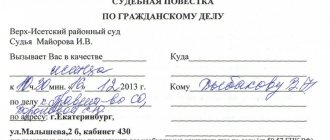The fact of theft of property can be revealed either during an audit (inventory) or at the time of the commission of the offense. The troublemaker can be stopped by inspectors at the checkpoint, or the moment of the theft can be recorded by a video camera installed in the premises. And here is the main intrigue. The fact is that if you want to get rid of a dishonest employee, you must strictly comply with all the requirements of the law so that the lawyer does not “turn his nose.” Otherwise, it is quite possible that the court will reinstate the thief at work, and you will still have to pay him for the time he was forced to miss.
"I do not trust you…"
It should be noted that in some cases it is possible to get by with little bloodshed, without the involvement of internal affairs bodies, investigations and trials. If the amount of damage revealed during the audit is insignificant and management does not have sufficient evidence that the property was stolen, then you can say goodbye to the employee in accordance with clause 7, part 1, art. 81 of the Labor Code of the Russian Federation - due to loss of trust.
As explained by the Supreme Court of the Russian Federation, termination of an employment contract for this reason is possible only in relation to employees directly servicing monetary or commodity assets (reception, storage, transportation, distribution, etc.), and provided that they committed actions that gave the employer grounds for loss of confidence in them. Also, these employees can be dismissed due to loss of confidence and in cases not directly related to their work: when it is established that theft, bribery and other selfish offenses have been committed (clause 45 of the resolution of the Plenum of the Armed Forces of the Russian Federation dated March 17, 2004 No. 2).
Simply put, if a cashier of an organization, while shopping in a store after work, stole a package of cookies, and the employer found out about it, then such a cashier can be fired. After all, a director can hardly trust an employee with large sums of money when he steals goodies from the store in his free time.
Digital signature fraud
Electronic digital signature is used by almost all business entities. But, in addition to the convenience and possibility of remote work, the use of digital signature also poses a financial threat. There are two possible scenarios:
- the director himself transfers the digital signature to his subordinates (accountant), who, using their trust, withdraw the company’s money;
- attackers forge digital signatures using forged documents and issue a signature to a dummy person. And thus they seize control of finances.
The PayControl application for electronically signing documents and money transfers at Ak Bars Bank makes it possible to control all transactions on the account even without Internet access. The key is tied directly to the mobile device. The program does not use SMS and push codes, so scammers will not be able to intercept data.
Documentary red tape
When discovering facts of loss of property (or other actions, for example, weighing, shortchanging customers, using accountable valuables for personal purposes, destroying valuables, etc.), the first thing the employer should do is ask the employee for an explanation. An employee can come up with a reason for what he did for two days. This is exactly the period allocated for this by the Labor Code (Article 193 of the Labor Code of the Russian Federation). It is advisable to request explanations in writing, handing this request to the employee against signature. From now on, every step must be documented. So, if the employee did not provide an explanation, this must be recorded in the act.
Can pregnant women do anything?
If an employee who took, for example, a box with jars of pickles from the procurement workshop turned out to be pregnant, then the employer will only have to complain about the hormonal explosion, or, in extreme cases, reprimand her. A pregnant woman cannot be fired either due to loss of trust or due to theft of someone else’s property at her place of work. The Labor Code allows the dismissal of pregnant women at the initiative of the employer only in the event of liquidation of the organization (Part 1 of Article 261 of the Labor Code of the Russian Federation).
In addition, it is necessary to draw up orders for the application of disciplinary sanctions (dismissal) and the order for dismissal itself (according to the unified form No. T‑8, approved by Resolution of the State Statistics Committee of Russia dated 01/05/2004 No. 1).
Summarizing what was said above, we emphasize that dismissing an employee who has encroached on someone else’s property on the grounds specified in clause 7 of Part 1 of Art. 81 of the Labor Code of the Russian Federation (due to loss of trust), is possible only if the employee directly handles funds and material assets. This condition does not necessarily follow from an agreement on full financial liability. These functions of employees can be enshrined in an employment contract, job description, and other similar documents. The procedure for dismissal established by law must also be strictly observed. And from the above resolution of the Plenum of the Armed Forces of the Russian Federation it follows that the employer must prove that the employee committed guilty actions that led to the loss of valuables. Otherwise, there is a high probability that the court will consider the dismissal illegal and order the employee to be reinstated. For example, the Moscow City Court, in its ruling dated June 22, 2010 No. 33‑18390, declared the employer’s actions illegal because:
- the organization has not proven the validity of the dismissal (i.e., the mere fact of surplus and shortage of goods is not enough for dismissal);
- the order was signed by an unauthorized person (not a manager);
- the employee was not given two days to provide written explanations.
Objective and subjective sides
The object of a crime such as theft is property relations of a certain form. The subject is defined as other people's property and funds.
The subject of the offense is objects of the material world.
The objective side is precisely the secret theft of property of other citizens, to which the criminal himself had no rights. It is considered secret in the following cases:
- if it was committed in the presence of the owner, but unnoticed by the latter;
- when a crime took place in front of witnesses, but they did not understand that it was such;
- if it was admitted in the absence of the legal owner of the thing;
- when witnesses become persons who the offender knows cannot understand what is happening (mentally ill people or children);
- if the offense took place in the presence of witnesses who knew about the illegality of the act, but did nothing to eliminate it (for example, neighbors spy on a thief, but out of fear do not dare to confront him).
The subjective side of the crime is exclusively direct intent, the motive is a selfish goal.
The subject of the act is a capable person who has already crossed the age threshold of 14 years.
How is it proven
To substantiate the existence of a crime, possible witnesses to the incident are usually involved. Also required are CCTV camera recordings, photographs and videos that could have been taken by random passers-by.
The court takes into account all evidence found and provided when considering any criminal case and determining a specific preventive measure and its size.
Dirty laundry
There are situations when a loss of trust alone is not enough. For example, if the amount of theft is significant and it will have to be recovered through court, or if the valuables were stolen not by the cashier or storekeeper (i.e., the person directly servicing the valuables), but by a manager or accountant. An employee who has committed theft or embezzlement of property can be dismissed in accordance with paragraphs. "g" clause 6, part 1, art. 81 of the Labor Code of the Russian Federation. You can fire an employee who has misappropriated property not only of the employer, but also of third parties (for example, a video camera recorded how a late employee grabbed a cell phone forgotten by a colleague). Depending on the size of the theft, the employee may be brought to either administrative (Article 7.27 of the Code of Administrative Offenses of the Russian Federation) or criminal (Articles 158, 159, 160, 164 of the Criminal Code of the Russian Federation) liability.
In order for you to have the right to dismiss an employee on the specified basis, the fact of theft must be confirmed either by a court verdict in a criminal case that has entered into force, or by a resolution in a case of an administrative offense (subclause “d”, paragraph 6, part 1, article 81 of the Labor Code RF, paragraph 44 of the resolution of the Plenum of the RF Armed Forces of March 17, 2004 No. 2). An order to terminate an employment contract must be issued no later than one month from the date of entry into force of a court verdict or decision of a judge (body, official) authorized to consider cases of administrative offenses (Article 193 of the Labor Code of the Russian Federation, paragraph 44 of the resolution of the Plenum of the Armed Forces of the Russian Federation dated 03/17/2004 No. 2).
So, having convicted an employee of an unseemly offense, you must take the following actions:
- document the fact of theft;
- confirm the fact of theft with inventory results;
- file a complaint with law enforcement agencies.
The discovery of the fact of theft must be documented in an official memorandum, which sets out all the circumstances of the incident (date, time, place, who discovered, etc.). Also, as mentioned above, the Labor Code obliges employers to request an explanation from the employee before applying a disciplinary sanction (including dismissal) (Article 193 of the Labor Code of the Russian Federation). In addition, the manager can order an investigation, during which clarification can be requested from the employees responsible for storing these valuables, or other employees who can explain something about this matter (cleaners, watchmen, security guards).
All of the above documents (memo, employee explanations, inventory report) can be attached to the application, which a representative of the organization must submit to the police department on duty.
After a court verdict or resolution in a case of an administrative offense enters into force, an employee can be dismissed in accordance with paragraphs. "g" clause 6, part 1, art. 81 of the Labor Code of the Russian Federation. An employee can be dismissed in connection with committing theft at the place of work no later than one month from the date the court verdict or resolution enters into legal force (part 3, paragraph 44 of the resolution of the Plenum of the Armed Forces of the Russian Federation dated March 17, 2004 No. 2).
Who and how should confirm the crime
Only law enforcement agencies have the right to establish a citizen’s guilt. It is illegal to engage in arbitrariness and may result in serious sanctions from the law.
The police are required to carry out investigative measures. If she refuses to do this or points out that there is insufficient evidence of a crime, then you need to contact the prosecutor’s office.
This government body is not obliged to investigate the circumstances of the criminal case itself, but it can give appropriate instructions to the police department, after which they should take your application more seriously.
You can go to court only if you know for sure that the citizen you suspect actually committed theft, and also have some real evidence of this fact.
A right, not an obligation
It is worth noting that the employer is not at all obliged to fire an employee who is caught stealing or having a questionable deficiency. Dismissal due to loss of confidence (based on clause 7, part 1, article 81 of the Labor Code of the Russian Federation) and theft of other people’s property at the place of work (clause “d”, clause 6, part 1, article 81 of the Labor Code of the Russian Federation) is a disciplinary measure penalties that the employer can apply to the employee (or not apply) at its own discretion.
Attention!
Only one disciplinary sanction can be applied for one disciplinary offense. This follows from Part 5 of Art. 193 of the Labor Code of the Russian Federation. If, for example, you catch an employee embezzling, reprimand him and immediately fire him, the court will reinstate him at work (decision of the Moscow Regional Court dated June 1, 2010 No. 33-10485, determination of the Leningrad Regional Court dated January 14, 2010 No. 33-92 /2010, ruling of the Nizhny Novgorod Regional Court dated September 29, 2009 No. 33‑7420/2009).
Even the very fact of a conviction or a decision imposing an administrative penalty against an employee does not mean that the employer is obliged to fire him. At the request of the manager, any other types of disciplinary action established by Art. 192 of the Labor Code of the Russian Federation (remark, reprimand).
And only if the employee is sentenced to imprisonment, the employer will be forced to fire him. If the employer has already applied another disciplinary sanction (for example, a reprimand) for the theft for which the employee was convicted, then the employee can be fired due to circumstances beyond the control of the parties. In particular, as one of such circumstances, the Labor Code names the conviction of an employee to serve a sentence that precludes the continuation of previous work in accordance with a court verdict that has entered into legal force (Clause 4, Part 1, Article 83 of the Labor Code of the Russian Federation).
I demand satisfaction!
In addition to dismissal (or other disciplinary action), the employee faces punishment in the form of compensation to the employer for direct actual damages. Lost income (lost profits) cannot be recovered from an employee (Article 238 of the Labor Code of the Russian Federation). In case of theft, embezzlement, or shortage, the amount of damage is determined based on inventory data.
For the damage caused, the employee bears financial liability within the limits of his average monthly earnings, unless otherwise provided by the Labor Code of the Russian Federation or other federal laws (Article 241 of the Labor Code of the Russian Federation), for example, upon dismissal due to loss of trust (if the employer did not contact law enforcement agencies with statement of theft).
If an employee is accused of theft or embezzlement, then he is assigned full financial responsibility (clause 5 of Article 243 of the Labor Code of the Russian Federation). However, the amount of stolen valuables that exceeds the average monthly salary can be recovered from the employee only through the court (Articles 242, 243 of the Labor Code of the Russian Federation).
To recover the amount of damage, the head of the organization must issue an order to withhold money within a month after the amount of damage is established (Article 248 of the Labor Code of the Russian Federation). You can deduct no more than 20% from an employee’s monthly salary. If deductions are made from an employee’s income according to executive documents, then their total amount should not exceed 50% of the salary (Article 138 of the Labor Code of the Russian Federation).
Elena Rakova
The wife was accused of stealing from a candy store and was taken away for questioning by the police.
My wife was once accused of paying for an order at a local bakery with someone else's card. The cameras showed her purchasing a takeaway coffee at the checkout counter at the same time as a transaction made with another person's card.
The wife came to the candy store a few days later, suspecting nothing, and the employees called the police. The police have already looked into the case following a statement from the injured woman, who allegedly lost her card. The objection sounded like this: it must be you, we remember you, but according to the cameras, there was no one in our bakery after you!
The testimony of witnesses spoke rather in our favor. The cashier mistakenly pointed to my wife, payment for the order using the missing card was not recorded anywhere, payment for coffee and fraudulent transactions on this card did not coincide in time. There were four transactions in total on the missing card, and in the footage from the bakery you can clearly see my wife only once bringing her phone to the bank terminal to pay for coffee.
All in all, the allegations were clearly false and the case was “thinly veiled.” We consulted with lawyers and contacted the prosecutor's office. A month later, the police called us and, without any explanation, told us to “forget about this matter.”
But how could we forget about it now? This day worried our whole family for a whole month. Imagine that it was there that my wife, a mother with a four-month-old daughter in a stroller, was asked to “leave the baby with someone she knows” and was taken to the police station for a three-hour interrogation. During the interrogation, of course, they put moral pressure on me, persuaded me to write a witness statement, took away my phone and all the other “joys” of being in custody. And then for a month they continued to call me for a polygraph test (it was a lie detector test for several hours), convincing me to plead guilty again and not ruin my daughter’s life with my future article after the case was closed! This is a real failure! And the young nursing mother had to endure all this for a month.
The husband began to have health problems and was unable to feed his daughter due to a nervous breakdown. We invited all our friends and acquaintances, and our indignation was boundless. We were advised to get back on our feet and declare war on the dishonest staff and indifferent bakery management on social media through our friends, local bloggers and the media. We were also advised to sue this ill-fated establishment and demand generous punitive damages for false accusations, violation of consumer rights and everything else.
Dear Editor, could you please advise us what to do in our situation? How to properly file a claim? Should pastry shop owners who were aware of the situation but not take it seriously need to be notified in advance? Instead of dealing with the situation, carefully reviewing the camera footage and looking for scammers at the cash register, they simply gave up on the investigation and still don’t think about apologizing.
I would appreciate your answer.
Best regards, TJ fans.
It's great that the situation was successfully resolved. And you have the right to demand compensation - only if it is paid to you not by the cafe administration, but by the state.
If your spouse was suspected of criminal charges, he has the right to rehabilitation.
What actually happened
From what you tell me, a woman's bank card was stolen. She reported this to the police and they opened a criminal case.
Then this bank card was charged in a cafe where the wife was shopping. Cafe employees testified that she was the only one making payments during the debit period.
Therefore, based on this evidence, the police suspected that Mr. Wife made payments with a stolen bank card.
It follows that the cafe service does not accuse your wife of theft. It's unlikely that they were present at the theft and could point it out to someone else - look, we saw this person take the card out of his wallet and pay for it. They only indicate that your wife paid the card.
From the police's point of view, the woman whose card was stolen is the victim. Cafe employees are witnesses. And your spouse is suspicious. And evidence is not useful for a wife.
The cafe employees do not blame anyone, but say: “You were definitely there, they remembered you, and there was no one behind you on the cameras.” They say the police are likely. The investigation or investigator records their testimony in a report.
The police seem to be making up their minds - there is evidence. To support the position of the prosecutor's office, investigators take over the recording from industrial cameras - he thinks that this will definitely confirm the guilt of the spouse.
But it's the other way around - the records don't agree on the timing, number of transactions or method of payment - because the spouse paid for the phone with a phone instead of a card. And in this case, it is easy to check whether a bank card is associated with a specific phone and whose phone it is.
With this evidence the case cannot be made to the court - referee judge.








